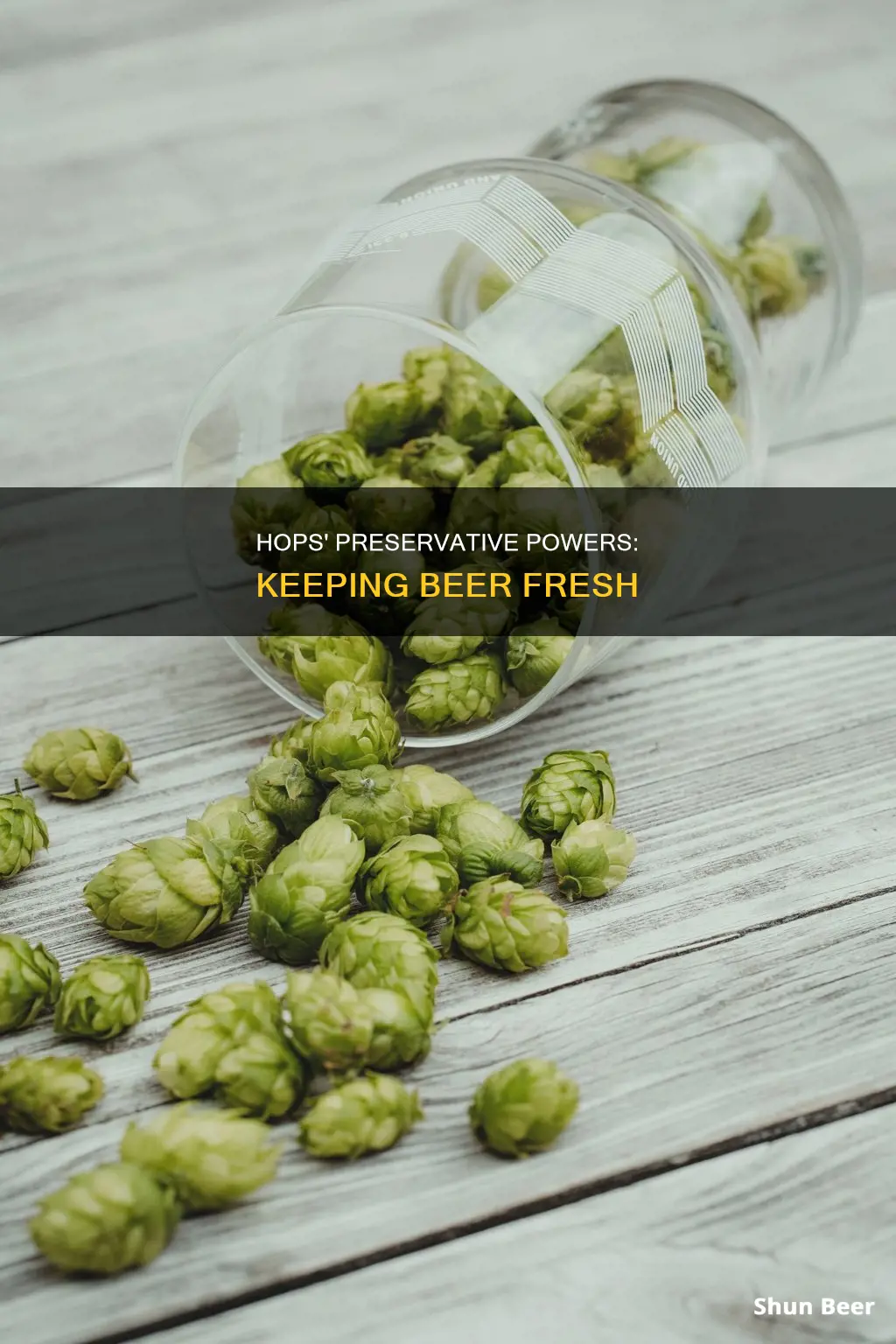
Hops are an essential ingredient in beer brewing and play a significant role in determining its flavour, aroma, and overall quality. They are the cone-shaped flowers of a female climbing plant in the cannabis family and are usually grown on tall trellises. Hops contain lupulin, a sticky substance that is secreted when boiled and contains essential oils, bitter acids, and resins that contribute to the beer-making process. One of the key roles of hops is preservation. The antibacterial and antimicrobial properties of hops prevent the growth of spoilage bacteria and inhibit bacterial infection, thereby increasing the shelf life of beer.
| Characteristics | Values |
|---|---|
| Antimicrobial properties | Inhibit the growth of gram-positive bacteria |
| Antibacterial properties | Prevent the growth of spoilage bacteria |
| Preservation method | Natural preservative |
| Preservation duration | Delay the inevitable effects of bacterial spoilage |
| Beer appearance | Stabilize the foam |
What You'll Learn
- Hops contain antibacterial properties that prevent bacterial growth and spoilage
- They help stabilise the foam in beer, creating an attractive appearance
- Hops have antimicrobial properties that work against gram-positive bacteria
- The alpha acids in hops counteract and delay the effects of bacterial spoilage
- Beta acids in hops also help delay the effects of spoilage

Hops contain antibacterial properties that prevent bacterial growth and spoilage
Hops have been used as a natural preservative in beer for centuries, with brewers taking advantage of their antimicrobial properties to prevent the growth of bacteria that can spoil the beverage. Even today, with modern refrigeration and sanitation practices, hops continue to play a crucial role in preserving beer and maintaining its freshness.
The antibacterial properties of hops are especially important in the context of historical beer preservation. Before the widespread use of refrigeration and sanitisation techniques, brewers relied on the antibacterial qualities of hops to prevent spoilage during long-distance transportation and storage. For example, British merchants in the 18th century used hops to preserve beer during sea voyages to India, ensuring that the beer remained drinkable for troops and expats in the region.
In addition to their preservative qualities, hops also contribute significantly to the flavour, bitterness, and aroma of beer. The alpha acids in hops provide bitterness, which counterbalances the sweetness of the barley, while the beta acids, in addition to their preservative role, contribute to the overall flavour profile of the beer.
The Hoppy Truth: Do All Beers Have Hops?
You may want to see also

They help stabilise the foam in beer, creating an attractive appearance
Hops are an essential ingredient in beer brewing and play a significant role in determining its flavour, aroma, and overall quality. They also help stabilise the foam in beer, creating an attractive appearance.
Hops are the cone-shaped flowers of a female climbing plant in the cannabis family of plants. They contain pinhead-sized glands of lupulin, a sticky substance that’s secreted when boiled. Lupulin contains the essential oils, bitter acids, and resins that contribute to the beer-making process.
The stabilisation of foam in beer by hops is one of the four big jobs that hops perform in the beer-making process. The other three are contributing bitterness to counterbalance the sweetness of barley, adding flavour, and providing aroma.
The antibacterial and antimicrobial properties of hops prevent the growth of bacteria in beer, which can cause spoilage and spoil the flavour. This, in turn, helps to stabilise the foam in beer and create a more attractive appearance.
Overall, the use of hops in beer brewing is essential for creating a desirable flavour, aroma, and appearance, as well as for preserving the beer.
Hops Beer: The Secret Behind the Bitter Buzz
You may want to see also

Hops have antimicrobial properties that work against gram-positive bacteria
Hops have been used for their medicinal properties for centuries, and their antimicrobial properties are well-documented. Hops contain bitter acids, which are further divided into alpha acids (humulones) and beta acids (lupulones). These bitter acids are responsible for hops' antimicrobial activity, particularly against Gram-positive bacteria.
The antibacterial activity of hops can be attributed to the presence of humulone (an alpha acid), lupulone (a beta acid), and the polyphenol xanthohumol. Hops have been shown to be effective against several types of Gram-positive bacteria, including Lactobacillus, Streptococcus, Staphylococcus, Listeria, Clostridium, and Bacillus species.
The antibacterial mechanism of hops involves interfering with the bacterial cell plasma membrane. The prenyl group of hop acids disrupts the cell membrane, inhibiting the active transport of sugars and amino acids. This disruption leads to an accumulation of protons inside the cell and a decrease in nutrient uptake, ultimately resulting in cell death.
The antimicrobial activity of hops has been studied extensively, and it is believed that the antimicrobial effects are due to a combination of different hop components rather than a single compound. Further research is being conducted to identify and characterize the individual antibacterial components of hops and their mechanisms of action.
Hops have been used in the brewing industry for their antimicrobial properties to prevent beer spoilage and stabilize foam, contributing to the overall quality of the beer.
Where to Find Tropical Hop Beer Near You
You may want to see also

The alpha acids in hops counteract and delay the effects of bacterial spoilage
Hops are an essential ingredient in beer brewing and they play a significant role in determining its flavour, aroma, and overall quality. They are the cone-shaped flowers of a female climbing plant in the cannabis family and are usually grown on tall trellises. Hops contain lupulin, a sticky substance that is secreted when boiled and contains the essential oils, bitter acids, and resins that contribute to the beer-making process.
The alpha acids found in hops are responsible for adding bitterness to the beer, counterbalancing the sweetness of the barley. However, it is the beta acids in hops that provide the antibacterial properties that help preserve the beer by counteracting and delaying the effects of bacterial spoilage. This gives beer a longer shelf life.
The antibacterial properties of hops prevent the growth of bacteria that can cause spoilage and negatively impact the flavour of the beer. Hops also help stabilise the foam in beer, creating a more attractive appearance. The addition of hops can also inhibit spoilage bacteria and help stabilise foam during the beer's shelf life.
Overall, the beta acids in hops, by delaying the effects of bacterial spoilage, play a crucial role in preserving the beer, ensuring it remains drinkable and flavourful for a more extended period.
Hops' Role in Brewing: Aromatic and Bitter Beer Balancing
You may want to see also

Beta acids in hops also help delay the effects of spoilage
Beta acids in hops are essential for brewing beer. While alpha acids contribute to bitterness and essential oils add aroma, beta acids are responsible for other aspects of beer's taste and stability. Pure beta acid tastes astringent and somewhat bitter, but this bitterness is more subtle and smooth than the intense and sharp bitterness of alpha acids.
Beta acids contribute to the overall flavour and stability of beer. They can oxidise over time, resulting in a more subtle and smooth bitterness. Additionally, beta acids have antimicrobial properties that help protect beer from spoilage.
The antibacterial properties of hops have been observed for centuries, not only in beer production but also in making bread. Hops have long been used as a natural preservative, and there are commercial applications outside the brewing industry, particularly when gram-positive bacteria must be controlled or inhibited in biochemical processing, feed additives, or food applications.
In summary, beta acids in hops play a crucial role in shaping the final beer product. They contribute to the taste and stability of beer and provide antimicrobial protection, helping to delay the effects of spoilage.
Frequently asked questions
Hops contain antibacterial and antimicrobial properties that prevent the growth of spoilage bacteria and delay the effects of bacterial spoilage, giving beer a longer shelf life.
The antibacterial properties of hops come from the lupulin, a sticky substance found in the hops' pinehead-sized glands.
Using hops to preserve beer has several benefits. Hops can inhibit spoilage bacteria during a beer's shelf life, stabilize its foam, and balance its sweetness.







